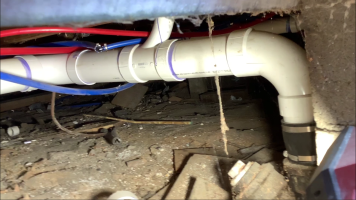I’ve been in this industry for over 40 years. I started out swinging a hammer, worked under a general contractor, ran my own jobs, and eventually became an inspector, plans examiner, and building official. I know what it’s like to be on both sides of the table. I’ve seen how the game is played, and I’ve seen how homeowners end up paying the price when they trust the wrong contractor.
Let me say this plainly: if a contractor tells you not to pull a permit, or offers to “save you time and money” by skipping one, that is a massive red flag. It’s not a shortcut. It’s a warning sign.
Good contractors pull permits. They know the codes, they stand behind their work, and they aren’t afraid to have it inspected. Even then, they occasionally fail an inspection. That’s normal. That’s how the system is supposed to work. And when it happens, the good ones fix the issue and move on.
So, if the professionals with licenses, experience, and reputations to protect can fail an inspection, what do you think is happening on the jobs that never get inspected?
I’ll tell you. They’re usually a mess.
As a building official, I’ve stopped work on more unpermitted jobs than I can count. And every time, it’s the same story. Structural framing that doesn’t carry the load. Electrical splices are buried in walls. Plumbing that will leak, back up, or worse. We don’t just find mistakes. We find hazards, fire hazards, collapse hazards, and health risks.
And the homeowner is the one stuck cleaning it up.
Insurance won’t cover unpermitted work. Code enforcement might fine you. You could be forced to tear it out and do it again the right way. That cheap deal you got from the guy who promised to “take care of it off the books” just became the most expensive mistake you’ve made.
Sometimes, the contractor wasn’t even licensed. Sometimes they’re working under someone else’s license. Sometimes they’re just hoping no one notices. But every time, they’re counting on one thing, that you won’t know better.
Well, now you do.
Even when I was still contracting, I saw the damage this caused. I’d get calls from homeowners who had already paid for a job that was done wrong. Most of the time, it wasn’t permitted. No inspections. No oversight. No protection. And I’d have to go in, rip it all out, and do it again. Those folks ended up paying twice, once for the mistake and once to fix it. They didn’t deserve that.
It’s hard enough to find a contractor you trust. But if you finally do, and they try to talk you out of pulling a permit, that should raise serious questions. If the work is solid, if the contractor knows what they’re doing, and if they’re truly licensed, there’s no reason to avoid the inspection process.
So here’s my message to the public: if your contractor says a permit isn’t needed, don’t take their word for it. Call your local building department and ask. If your contractor says a permit will cost too much or take too long, ask what they plan to skip. And if they resist having their work inspected, ask what they’re afraid of.
This isn’t about throwing all contractors under the bus. It’s about making sure homeowners understand the risk of trusting someone who won’t stand behind their work in front of an inspector. The good contractors don’t mind the scrutiny; they welcome it. They know that code-compliant work protects their clients and their own reputations.
And to all the building officials, inspectors, and code professionals out there, chime in. Share your stories. What have you found on jobs that were done without permits? What kind of damage did it cause? What did it take to fix? Let’s use this thread to educate the public on what really happens when permitting laws are ignored.
A permit is more than a piece of paper. It’s protection for the homeowner, the community, and the contractor who does it right.
Let me say this plainly: if a contractor tells you not to pull a permit, or offers to “save you time and money” by skipping one, that is a massive red flag. It’s not a shortcut. It’s a warning sign.
Good contractors pull permits. They know the codes, they stand behind their work, and they aren’t afraid to have it inspected. Even then, they occasionally fail an inspection. That’s normal. That’s how the system is supposed to work. And when it happens, the good ones fix the issue and move on.
So, if the professionals with licenses, experience, and reputations to protect can fail an inspection, what do you think is happening on the jobs that never get inspected?
I’ll tell you. They’re usually a mess.
As a building official, I’ve stopped work on more unpermitted jobs than I can count. And every time, it’s the same story. Structural framing that doesn’t carry the load. Electrical splices are buried in walls. Plumbing that will leak, back up, or worse. We don’t just find mistakes. We find hazards, fire hazards, collapse hazards, and health risks.
And the homeowner is the one stuck cleaning it up.
Insurance won’t cover unpermitted work. Code enforcement might fine you. You could be forced to tear it out and do it again the right way. That cheap deal you got from the guy who promised to “take care of it off the books” just became the most expensive mistake you’ve made.
Sometimes, the contractor wasn’t even licensed. Sometimes they’re working under someone else’s license. Sometimes they’re just hoping no one notices. But every time, they’re counting on one thing, that you won’t know better.
Well, now you do.
Even when I was still contracting, I saw the damage this caused. I’d get calls from homeowners who had already paid for a job that was done wrong. Most of the time, it wasn’t permitted. No inspections. No oversight. No protection. And I’d have to go in, rip it all out, and do it again. Those folks ended up paying twice, once for the mistake and once to fix it. They didn’t deserve that.
It’s hard enough to find a contractor you trust. But if you finally do, and they try to talk you out of pulling a permit, that should raise serious questions. If the work is solid, if the contractor knows what they’re doing, and if they’re truly licensed, there’s no reason to avoid the inspection process.
So here’s my message to the public: if your contractor says a permit isn’t needed, don’t take their word for it. Call your local building department and ask. If your contractor says a permit will cost too much or take too long, ask what they plan to skip. And if they resist having their work inspected, ask what they’re afraid of.
This isn’t about throwing all contractors under the bus. It’s about making sure homeowners understand the risk of trusting someone who won’t stand behind their work in front of an inspector. The good contractors don’t mind the scrutiny; they welcome it. They know that code-compliant work protects their clients and their own reputations.
And to all the building officials, inspectors, and code professionals out there, chime in. Share your stories. What have you found on jobs that were done without permits? What kind of damage did it cause? What did it take to fix? Let’s use this thread to educate the public on what really happens when permitting laws are ignored.
A permit is more than a piece of paper. It’s protection for the homeowner, the community, and the contractor who does it right.


